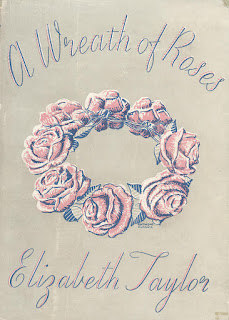A Wreath of Roses by Elizabeth Taylor

While canonical literary history has generally told the story of 20th Century British fiction as the story of men, with some exemplary women here and there, we have enough distance now to see that while the men were certainly the grabbers of headlines and awards, their canonicity was less a matter of merit than of their control of the culture industry. The men ate up all the air in the rooms of litchat. Meanwhile, by and large it was women who wrote the fiction that has survived the years the best, and which remains most readable and interesting today. This is especially true around midcentury, where we can speak of Rebecca West (1892-1983), Sylvia Townsend Warner (1893-1978), Naomi Mitchison (1897-1999), Elizabeth Bowen (1899-1973), Anna Kavan (1901-1968), Stevie Smith (1902-1971 [best known as a poet, but author of 3 interesting novels]), Leonora Carrington (1917-2011), Muriel Spark (1918-2006), Iris Murdoch (1919-1999), Doris Lessing (1919-2013) — and many others, both well-know...
